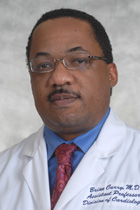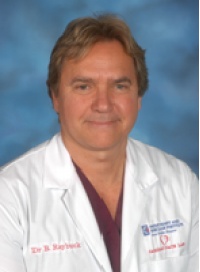
Bryan H. Curry
Cardiologist | Interventional Cardiology
2041 Georgia Avenue Towers Building 4100 Washington District of Columbia, 20060About
Bryan H. Curry, MD, works at Howard University in Washington, DC. He is a clinical cardiologist there as well as an Assistant Professor of Medicine. One of the Washington Post's Super Doctors, Dr. Curry also specializes in nuclear cardiology, or using nuclear imaging to treat vascular diseases. At Howard, he is Assistant Director of Echocardiography and Nuclear Cardiology.
Bryan H. Curry's Videos
Education and Training
Howard University College of Medicine
Board Certification
American Board of Internal Medicine- Cardiovascular Disease
Nuclear Cardiology
Provider Details
Areas of expertise and specialization
Faculty Titles & Positions
- Assistant Professor of Medicine, Howard University -
Awards
- Super Doctors, Washington Post
Fellowships
- Washington Hospital Center (Nuclear Medicine)
Professional Society Memberships
- American College of Cardiology, American Association of Black Cardiologists, American society of Echocardiography, American Society of Nuclearcardiography
What do you attribute your success to?
Perseverance, Compassion, Passion for the Field
Hobbies / Sports
- Photography, Cooking, Tennis
Favorite professional publications
- Circulation, Journal of the American College of Cardiology
Bryan H. Curry's Practice location
Howard University Faculty Practice Plan
2041 Georgia Avenue Towers Building 4100 -Washington, District of Columbia 20060Get Direction
Bryan H. Curry's reviews
Write ReviewRecommended Articles
- Heart Palpitations: What Is It and What Are the Causes?
Our heart rate is automatically controlled by the autonomic nervous system (ANS) that has two divisions: sympathetic and parasympathetic. The part of the ANS that is responsible for raising a person’s heart rate through the sympathetic plexus is the sympathetic division. The parasympathetic...
- Who Should You Call if You Have a Congestive Heart Failure?
Congestive heart failure does not indicate that your heart has stopped working; instead what it indicates is that your heart is pumping blood at a slower rate than normal. Because the blood moves through the heart and the body at a much slower rate, the pressure in the heart builds up. Hence, the...
- Do I Have Hypertension?
High blood pressure, also known as hypertension, refers to the increased pressure exerted on the walls as blood passes through arteries. Normal blood pressure is measured as 120/80 mm Hg. Pressure in the range of 120/80 and 139/89 mm Hg is referred to as pre-hypertension, and those above the higher...
- What is Ischemia?
Ischemia refers to the condition in which the muscles of the heart do not get an adequate supply of oxygen. This mostly happens because of reduced blood flow to the cardiac muscles either due to complete blockages or due to a partial block in the blood vessels that carry blood. This condition, also...
- What are Atrial Fibrillation Blood Clots?
What are Atrial Fibrillation Blood Clots?Perhaps the terms Atrial Fibrillation Blood Clots are familiar with your ears or may be not, as the opposite applies to many and may be you are one of them. If you are in the latter group of people, then worry only if you have not read this article to the end...
- Atypical Forms of Myocardial Infarction
Atypical myocardial infarction often occurs in older patients with a pronounced cardiosclerosis, circulatory failure, and often with people who have a history of heart attacks.The symptoms may confuse you, or make you think that they are not associated with the heart.Usually, atypical manifestations...
Nearby Providers
- Nelson Bernardo M.D.110 Irving St Nw Washington DC 20010
- Alfred Myaing MD2863 Duke St Alexandria VA 22314
- Rakesh Sahni M.D.7474 Greenway Center Dr Greenbelt MD 20770
- Bryan Raybuck M.D.8505 Arlington Blvd Fairfax Virginia 22031
- Georgia S. Willie-Carnegie MD1160 VARNUM ST NE WASHINGTON DC 20017
- Feroz Padder7350 Van Dusen Rd Laurel MD 20707
Nearest Hospitals
MEDSTAR WASHINGTON HOSPITAL CENTERl
110 IRVING ST NW WASHINGTON DC 20010








